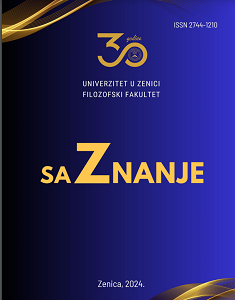STAVOVI UČITELJA RAZREDNE NASTAVE O UPOTREBI E-DNEVNIKA
ATTITUDES OF CLASSROOM TEACHERS ABOUT THE USE OF E-DIARY
Author(s): Sandra Kadum, Jelena GrbićSubject(s): Education, School education, Family and social welfare, Sociology of Education
Published by: Filozofski fakultet, Univerzitet u Zenici
Keywords: teachers; e-Diary; traditional directory; teaching; classroom teaching;
Summary/Abstract: Technology, due to its rapid development, affects the changes and development of society every day, it has also affected the educational system. In the school year 2011/2012, e-Diary was introduced as a Carnet pilot project in the Republic of Croatia. Since teachers have been using eDiary for a long time, there are experiences related to its application and work. The goal of the conducted research was to determine whether the classroom teachers in the elementary school are satisfied with the e-Diary. For the purposes of the research, a questionnaire was created and posted on social networks, to groups of classroom teachers: 986 teachers filled out the questionnaire. The results show that 84.0% of the research participants are satisfied with the e-Diary application. Due to the possibility of viewing the e-Diary, 78.9% of the respondents state that parents come less often for individual information for their child. Almost ⅔ of the respondents (64.3%) are satisfied with the sections in the e-Diary compared to the traditional diary, while 27.5% are undecided. During the introduction of the e-Diary, schools organized training on the use of the e-Diary, so 55.7% of respondents attended the training, while 32.6% of them stated that no such training was organized. Regarding the recording of data (recording of grades, written monitoring of students, etc.), 71.3% of respondents declare that using the e-Diary is easier for them compared to the "old" way of keeping records, while 13.1% state that it is the same in keeping the e-Diary and a traditional (paper) diary/directory. Furthermore, respondents most often point out that there are more places to enter written monitoring of students and faster data entry as advantages. As for the shortcomings, they most often state that the grades are unclear, because you have to enter every subject, the impossibility of all-day registration of student absences and the need for a good Internet connection.
Journal: saZnanje
- Issue Year: 4/2024
- Issue No: 4
- Page Range: 423-440
- Page Count: 18
- Language: Croatian

